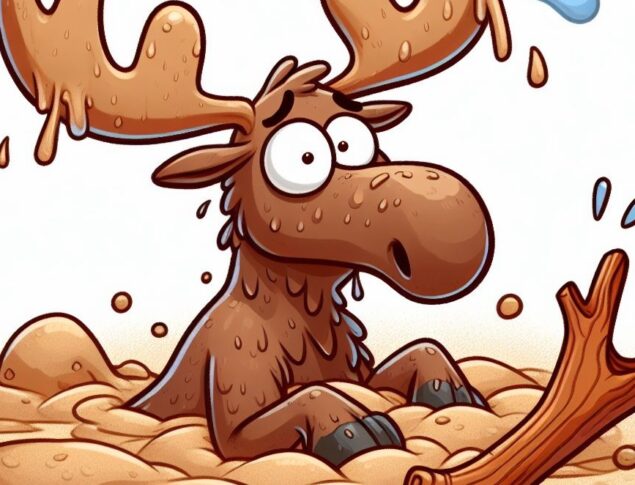What do our economy, the Liberal Party, and a moose stuck in quicksand have in common? They are all sinking. Canada’s economy contracted in the latest economic update. It shrank by 1.1%. Statistics Canada quietly revised their Q2 numbers upward. You will recall that we contracted in Q2 as well. Does that mean Statistics Canada is covering for the Liberals? Well, no. Not exactly. The raw data that drives these numbers is so complicated I am fairly sure not a single person in Ottawa knows enough to manipulate them in a way that would be convincing. It would show up somewhere, like a 50,000% increase in electronics exports or something.
Anyways, the point is that an extra 1% here or there does not change the fact that Canada’s economy is stuck in quicksand just like our proverbial moose. It is no coincidence that the economy is likewise dragging down the Liberal Party polling numbers. The economy and incumbent polling often go hand in hand. When the economy is doing poorly, the party in power gets kicked out. That is common wisdom and there are certainly exceptions to the general rule. Likewise, Trudeau has been in power for 8 years at this point. No matter how nice their hair is, all leaders grow stale over time and get the boot.
How did we even get to this moment? It is not like anyone saw this coming. Right?

So the winds are certainly blowing in Trudeau’s face. The latest polling data shows Conservative support at 40% which is about where majority territory is. There is just one problem: we have been here before. I want you to think back to 2018 in the lead up to Trudeau’s first re-election. Andrew Scheer is selected as the new Conservative leader and Maxime Bernier runs off to create the PPC. I will come back to the PPC in a bit. In the summer 2019, the most anticipated election in recent memory was in full swing. The pre-campaign spending was ramping up and conservatives flirted with high 30s in support. Source Then we all know what happened. Despite an insane blackface scandal, Trudeau won again. He was reduced to a minority government, but since the NDP agree with just about everything he has had a functional majority for most of the time since then.
Toronto and Montreal wanted nothing to do with the Conservative Party. They made a huge tactical mistake believing that Quebec would reward them. They did not. They never do. Do you remember seeing that solid blue map from the Red River west to the Fraser? Not a single prairie riding turned red between Winnipeg and metro Vancouver. The Conservatives still lost. They won the popular vote but it did not matter. Toronto, Montreal, Ottawa, Vancouver, Winnipeg, and Atlantic Canada all voted Liberal and the rest did not matter. Source
Do you see the pattern yet? Pierre is sitting today almost exactly where Andrew Scheer sat in 2018/2019. Did Toronto, Montreal, and Atlantic Canada suddenly have an epiphany and will decide to vote for a Conservative? I doubt it. I certainly know that the one thing unchanged from 2019 is that the West still does not decide the election. So whenever that next election is and against whom ever it may be will not change the fact that Pierre will spend it campaigning for seats in GTA, Montreal mainland, and Atlantic Canada. The only way Calgary sees him is when he attends fundraisers or debates. Small-town Sask has probably never seen him except on TV. Your votes do not matter and you do not give him enough money to get his attention. It is not as if the Conservative Party is so broke that they cannot drive a bus along the Yellowhead and stop in at each town.
That pivots me to Maxime Bernier. I think his angle is he wants to be the Canadian Geert Wilders. He runs a platform strikingly similar to other populist, anti-establishment politicians. He clearly resonates with a small and dedicated base of supporters. The unfortunate tragedy is that conditions in Canada must get much worse for Bernier to ever catch on with any sizeable segment of the population. Without a region to call his home, he stretches his resources far too thin. Ask the Green Party, running any semblance of a national campaign in a country as big as this one is a tall order for smaller parties. Heck, even the NDP piles on a mountain of debt every election. Bernier speaks to the frustrations of many people across Canada and they are valid frustrations. People thinking of supporting the PPC in the West have a home here in Maverick. You will find plenty of overlap with our True Western Representation platform.
Regional Representation Makes Sense
The success of regional parties is a simple formula. Know your local voter and appeal to them. Trying to be all things to all people means you end up nothing to no one. We appeal to the Western voter with a desire for independence from government overreach in their veins. Look no further than the economy. If you read this report from TD Bank, you will see quickly that the West is the economic engine of this country. Quebec is spinning its wheels in the mud. All that is accomplished in spite of a federal government that will not get out of the way of our industries. Imagine if the true power of the West’s economic might was unleashed on the world markets. Imagine True Western Representation.
This article did several pivots, but the economy is always such a complicated and ingrained issue. Hardly anything is untouched by economic factors.
With Respect,
Tim Barnes
Tim is currently studying law at the University of Saskatchewan. He sits on the Maverick Board of Directors representing Saskatchewan. Feature image was generated using Bing AI.

